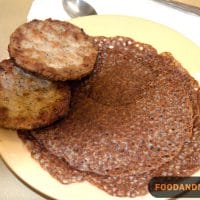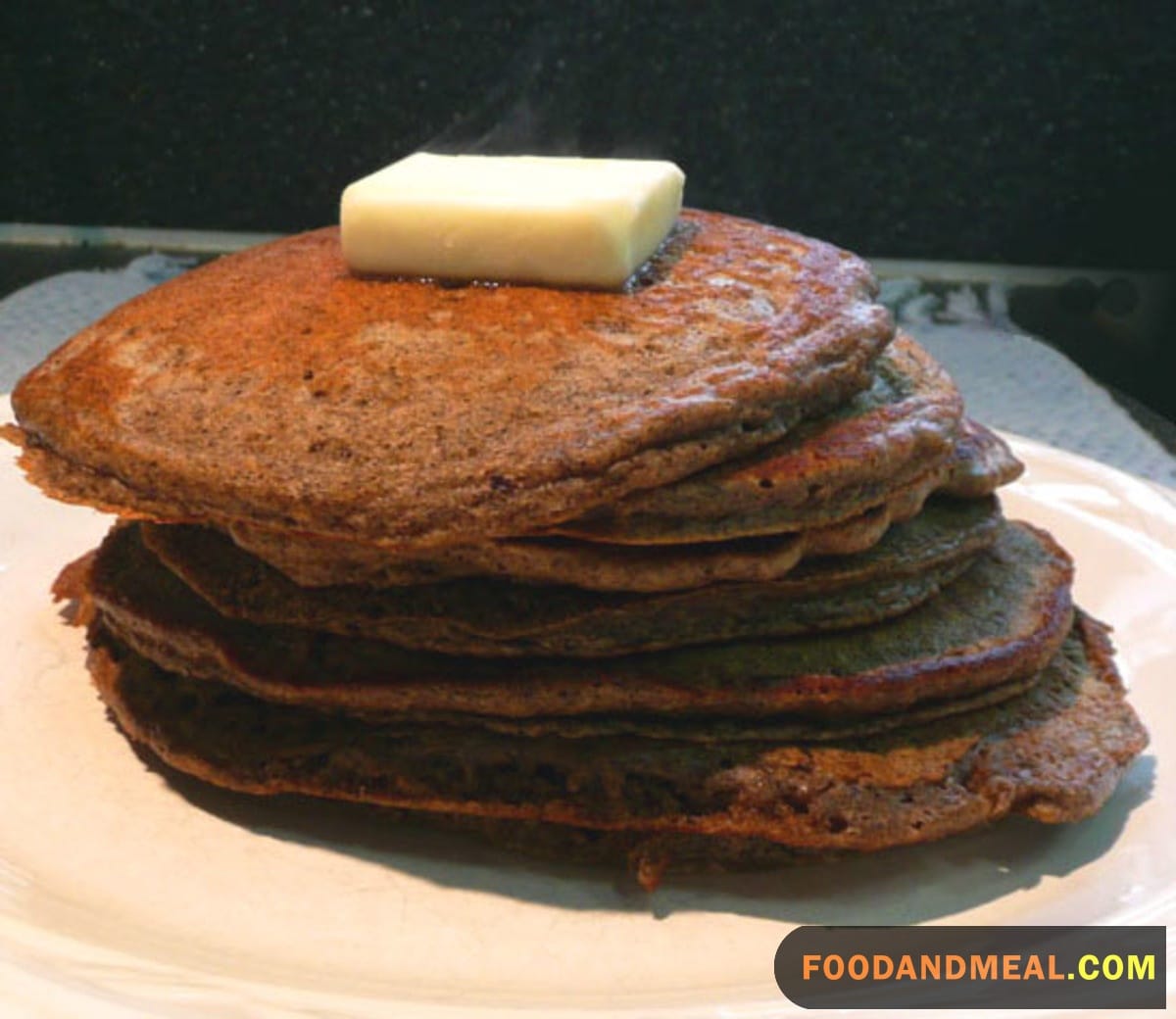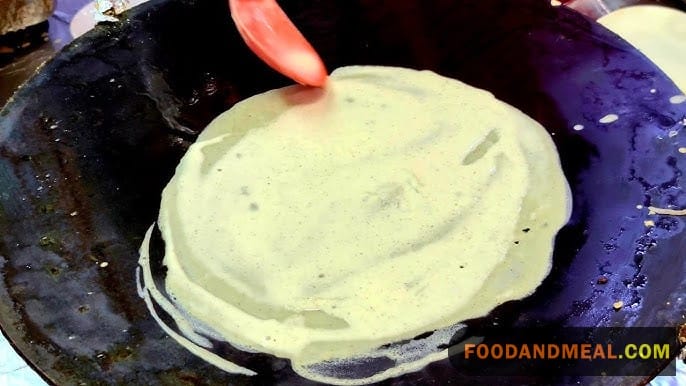As a food blogger for Food And Meal, I’m always looking for new and interesting recipes to share with my readers. Lately I’ve become fascinated with Korean cuisine and the amazing depth of flavors they create using simple ingredients. During my research into Korean food, I came across a traditional dessert called memilmuk, also known as Korean buckwheat cake. As soon as I saw photos of this hearty looking cake made with nutty buckwheat flour, I knew I had to try making it myself!
The first thing that drew me to memilmuk was its rustic, homey appearance – this cake looks like it would be right at home on your grandmother’s table! And yet it has an exotic twist with the use of buckwheat, which gives it such wonderful earthy, nutty notes. I love discovering new-to-me ingredients like buckwheat and finding ways to incorporate them into desserts and other treats.
When I read more about memilmuk, I learned that it’s often made to celebrate the Korean harvest festival, Chuseok. I was immediately captivated by the idea of carrying on this food tradition and bringing a little Korean culture into my own kitchen. The simplicity of the cake also appeals to me – it’s made from just a few humble ingredients like buckwheat flour, milk, and honey. After a lifetime of eating fancy desserts loaded with sugar and additives, I find myself craving simpler sweets like this buckwheat cake.
As I set out to make memilmuk for the first time, I felt eager to master this classic Korean dessert and share it with the Food And Meal audience. I hoped infusing my baking with some Korean flavors would transport my readers the way this cake transported me. Maybe making memilmuk would even inspire some of them to explore Korean cuisine on their own!

Korean Buckwheat Cakes Recipe

BUCKWHEAT “CAKES”
Equipment

Ingredients
Instructions
- In a bowl, mix together the flour, salt, and water to create a dough. Add a little more water if the dough seems too dry and is unmanageable.
- On a clean surface, roll out the dough with your hands into 1⁄4-inch-thick rectangles—about six of them.
- Arrange on a lightly oiled steamer tray. Steam over moderate heat for 10 minutes.
- Dust or top with soybean powder, honey, and/or brown sugar, if desired.
Video
Notes
Nutrition
© Food And Meal
This website provides approximate nutrition information for convenience and as a courtesy only. Nutrition data is gathered primarily from the Spoonacular Database, whenever available, or otherwise other online calculators.
Buckwheat Cakes Korean Recipe – Oven-Baked Method
In a roomy mixing bowl, embark on the batter creation journey by combining the buckwheat flour, salt, and other key ingredients dictated by the original recipe. Stir until a velvety batter akin to that of pancakes comes to life.
With a ladle or large spoon, gracefully pour small rounds of this batter onto the awaiting baking tray. Be mindful of the spacing, allowing room for individual cakes to shine during the baking process.
If your culinary masterpiece calls for embellishments like green onions or other garnishes, now is the time to generously sprinkle them on each cake.
Slide the tray into the preheated oven and let the magic happen for approximately 12-15 minutes. When the bottoms sport a golden brown allure, delicately flip each cake using a spatula and let them dance in the oven for another 6-7 minutes.
As the tantalizing aroma fills your kitchen, pull out the tray and let the cakes cool on a wire rack for a few minutes. This waiting game is a crucial step in preserving their delightful crispiness.
Cooking Tips

I found that getting the batter consistency right is key for properly crispy edges and a soft, custardy interior. The trick is adding just enough water to hydrate the buckwheat flour without making the batter too thin.
My first attempt turned out a little too cakey, so for the next round I reduced the water slightly. This made all the difference! The cakes browned up nicely in my cast iron skillet with a bit of vegetable oil and had a fantastic contrast of textures. I liked eating the memilmuk warm right out of the pan, topped with a drizzle of honey and some chopped walnuts. The nutty, whole grain flavor of the buckwheat paired so well with the subtle sweetness.
These satisfying little cakes make an excellent quick breakfast or snack. I’m looking forward to experimenting with different add-ins like dried fruits or cinnamon to put my own spin on this classic Korean street food.
Serving Suggestions

Serving suggestions abound for these Korean Buckwheat Cakes. For a savory twist, pair them with the rich umami of Miso Tare Dipping Sauce, allowing your taste buds to dance between the nutty essence of buckwheat and the savory depth of miso.
Alternatively, turn these cakes into a vessel for culinary creativity by crafting Egg Salad Wraps. The softness of the cakes harmonizes with the creaminess of the egg salad, creating a mouthwatering fusion of textures.
For those seeking a heartier experience, immerse the cakes in a soul-warming BEEF STOCK Stew. Each bite becomes a symphony of flavors as the cakes absorb the savory essence of the stew.
For a refreshing touch, garnish with thin slices of Sushi Ginger. The zesty ginger adds a burst of brightness, perfectly complementing the richness of the buckwheat.
Cap off your culinary journey with a sweet note, pairing these cakes with Sesame Candies. The delightful crunch of the candies provides a satisfying contrast, concluding your meal on a perfect note of balance and flavor.
List of 5 FAQs of Buckwheat Cakes

- Can I use regular wheat flour instead of buckwheat? While wheat flour can be used, it will alter the taste and texture of the cakes. Buckwheat offers a distinct, earthy flavor that’s integral to this dish.
- I’m gluten intolerant. Are these cakes safe for me? Absolutely! Buckwheat is naturally gluten-free, making it a great choice for those with gluten sensitivities. Just ensure other ingredients or garnishes you use are also gluten-free.
- How do I store leftover Buckwheat Cakes? Store any leftover cakes in an airtight container in the refrigerator for up to 3 days. You can reheat them in an oven or microwave before serving.
- Can I add other ingredients into the batter? Certainly! Feel free to get creative. Some popular additions include finely chopped vegetables, cheese, or even bits of cooked meat.
- The cakes seem a bit dry. What did I do wrong? Overbaking could be the culprit. Remember, ovens can vary, so keep a close eye on the cakes during the final minutes of baking. Adjusting your batter consistency or adding a touch more oil can also help.
Conclusion
In conclusion, buckwheat cakes make for a delicious and nutritious breakfast or snack. As discussed on the Food and Meal website, they have a great texture and earthy, nutty flavor from the buckwheat flour. They are naturally gluten-free and high in protein, providing lasting energy. Toppings like fruit, maple syrup, or nut butters make them even more crave-worthy.
Buckwheat cakes are also quite easy to make at home. You just need buckwheat flour, baking powder, salt, an egg, milk or non-dairy milk, and butter or oil. Mix up the batter then cook the cakes like pancakes on a griddle or skillet. Adjust the consistency as needed and flip when the edges look dry.
Hi! I'm Nazia of ‘Nazia Cooks’, a self-taught baker and cook residing in Chennai. Rooted in the rich South Indian culinary landscape, my palate has expanded to embrace global flavors. I revel in crafting fusion dishes, melding traditions to birth unique tastes.

